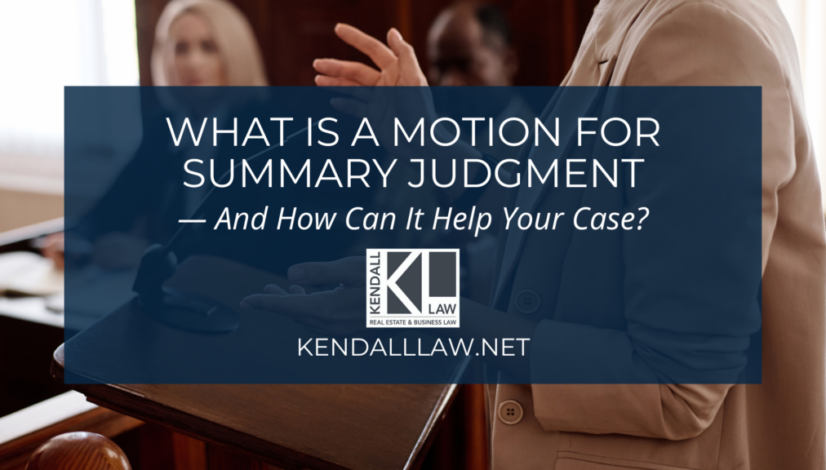What Is a Motion for Summary Judgment — and How Can It Help Your Case?
Part of our Litigation Insights Series, this article builds on our first post, “What Is the Litigation Process?” to help property owners understand key legal tools like the Motion for Summary Judgment.
In civil litigation, including real estate and landlord-tenant matters, a Motion for Summary Judgment (MSJ) can be a powerful tool to resolve a case efficiently—without going through a full trial.
What Is a Motion for Summary Judgment?
A Motion for Summary Judgment is a legal request asking the court to decide the outcome of a case before trial. It’s used when the essential facts are not in dispute and the law clearly favors one party. If successful, it can result in an early win, saving time, money, and resources for everyone involved.
When Is It Appropriate?
To succeed, the party filing the motion (the “moving party”) must show that:
- There are no genuine disputes of material fact—both sides essentially agree on what happened; and
- The law is clearly on their side, entitling them to judgment without a trial.
These motions are typically filed after the discovery process, which includes depositions, written questions (interrogatories), and document exchanges. If the opposing party fails to provide meaningful evidence to support their claims—or admits key facts during discovery—an MSJ may be warranted.
How the Court Decides
The judge reviews all submitted evidence, including sworn statements, deposition transcripts, and documents, to determine whether a trial is necessary. Even if the facts are not contested, the court must still find that the law supports the moving party’s position.
Why It Matters
Filing a Motion for Summary Judgment can:
- Lead to a faster resolution of your case
- Be a cost-effective alternative to a full trial
- Help eliminate weak or unsupported claims, narrowing the issues that need to be tried
When We Recommend Filing
At Kendall Law, we evaluate whether a Motion for Summary Judgment is appropriate early in the litigation process—particularly when the facts are clear, well-documented, and the opposing party lacks a strong legal basis for their claims. Our goal is always to pursue the most effective and strategic path to resolution for our clients.
Contact our experienced team at Kendall Law or call 310-619-4941 for help with your legal matter.
Please note that the information provided at this website is intended for general educational and informational purposes only, and should not be construed as legal advice or a substitute for legal advice from a qualified attorney in your jurisdiction.
Author: Eileen Kendall





